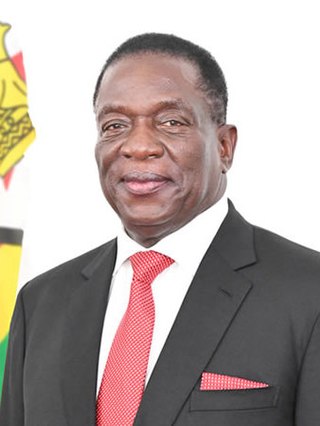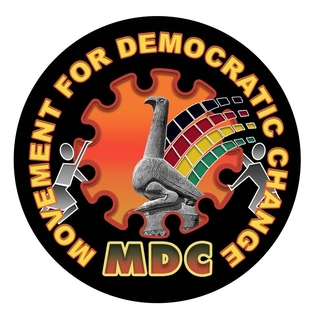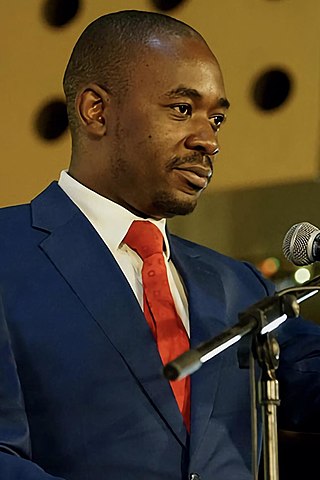
The Zimbabwe government consists of an elected head of state,the president,and a legislature. The presidential term lasts for 5 years,and is elected by majority,with a second round if no candidate receives a majority in the first round. The Parliament is bicameral,consisting of the House of Assembly and Senate. Following the 2013 constitution,the House of Assembly has 270 members. 210 are elected for five-year terms by single-member constituencies. Furthermore,the constitution specifies that for the two first parliaments,there are 60 additional seats reserved for women,6 seats per province,which are filled based on the votes for in the single-member constituencies,using party-list proportional representation,distributed using the largest remainder method and the hare quota. The Senate has 80 members:60 are elected for five-year terms in 6-member constituencies representing one of the 10 provinces,elected based on the votes in the lower house election,using party-list proportional representation,distributed using the hare quota. Additionally the senate consists of 2 seats for each non-metropolitan district of Zimbabwe elected by each provincial assembly of chiefs using SNTV,1 seat each for the president and deputy president of the National Council of Chiefs and 1 male and 1 female seat for people with disabilities elected on separate ballots using FPTP by an electoral college designated by the National Disability Board.

Parliamentary elections were held in Zimbabwe on 31 March 2005 to elect members to the Zimbabwe House of Assembly. All of the 120 elected seats in the 150-seat House of Assembly were up for election. There were a further 20 members appointed by the President and ten elected by traditional chiefs,who mostly support the government. Electoral colleges for the election of the ten chiefs to the parliament were to be held on 8 April.
Paul Themba Nyathi is a Zimbabwean opposition politician,the director of elections for the Arthur Mutambara-led faction of the Movement for Democratic Change and a member of the Pan-African Parliament from Zimbabwe.
Gibson Jama Sibanda was a Zimbabwean politician and trade unionist. He was a founding member of the Movement for Democratic Change and at the time of his death was the Vice-President of the faction of the Movement for Democratic Change led by Arthur Mutambara. A former president of the Zimbabwe Congress of Trade Unions,he was first elected to the House of Assembly in the 2000 parliamentary election. He was a member of the Senate and a Minister of State in the Office of Deputy Prime Minister Arthur Mutambara at the time of his death in 2010.

Emmerson Dambudzo Mnangagwa is a Zimbabwean politician who is serving as President of Zimbabwe since 24 November 2017. A member of ZANU–PF and a longtime ally of former President Robert Mugabe,he held a series of cabinet portfolios and was Mugabe's Vice-President until November 2017,when he was dismissed before coming to power in a coup d'état. He secured his first full term as president in the disputed 2018 general election. Mnangagwa was re-elected in the August 2023 general election with 52.6% of the vote.
Articles related to Zimbabwe include:

Thokozani Khupe is a Zimbabwean politician,trade unionist and CCC party member. She was Deputy Prime Minister 2009–13.
Lovemore Moyo is a Zimbabwean politician who was Speaker of the House of Assembly of Zimbabwe from 2008 to 2013. He was the National Chairman of the Movement for Democratic Change –Tsvangirai (MDC-T) party led by Morgan Tsvangirai from 2006 to 2018.
Sydney Tigere Sekeramayi is a Zimbabwean politician who served in the government of Zimbabwe as Minister of Defence between 2013 and 2017. He has been a minister in the Cabinet since independence in 1980,serving as Minister of Defence from 2001 to 2009 and Minister of State Security from 2009 to 2013.
Obert Moses Mpofu is a Zimbabwean politician,who served as Minister of Home Affairs from 2017 to September 2018. Previously he was Minister of Macro-Economic Planning and Investment Promotion;Minister of Industry and International Trade;Minister of Mines and Mining Development;and Minister of Transport and Infrastructure Development. The Cabinet of Zimbabwe was later dissolved on 27 November 2017. He was reappointed as Minister of Home Affairs in Mnangagwa's first cabinet on 30 November 2017. The Culture portfolio was added to his ministry. Mpofu was later removed from the Zimbabwe cabinet in September 2018.

Kembo Dugish Campbell Muleya Mohadi is a Zimbabwean politician and Vice-President of Zimbabwe since 8 September 2023. He previously served in the same role from 28 December 2017 to 1 March 2021,when he resigned. He briefly served as the Minister of Defence,Security and War Veterans in 2017. Previously he was Minister of State for National Security in the President's Office from 2015 to 2017 and Minister of Home Affairs from 2002 to 2015.

Sithembiso Gile Gladys Nyoni is a Zimbabwean politician and in 2023 the Industry and Commerce minister. She was a Minister of Small and Medium Enterprises Development and the minister of Women and Youth Affairs.
Webster Kotiwani Shamu is a Zimbabwean politician and former Minister of Mashonaland West Provincial Affairs who was fired by President Emmerson Mnangagwa on 21 May 2018. He previously served as Minister of Information and Publicity,and as Minister of State for Policy Implementation. He is a member of parliament representing the Chegutu constituency. The Cabinet of Zimbabwe was later dissolved on 27 November 2017.
Chitungwiza North is a constituency represented in the National Assembly of the Parliament of Zimbabwe,located in Harare Province. It covers part of Chitungwiza,a dormitory city of Harare. Its current MP since the 2013 election is Godfrey Sithole of the Citizens Coalition for Change.

The Movement for Democratic Change (MDC) was a Zimbabwean political party organised under the leadership of Morgan Tsvangirai. The MDC was formed in 1999 as an opposition party to President Robert Mugabe's Zimbabwe African National Union –Patriotic Front (Zanu-PF). The MDC was made up of many civic groups who campaigned for the "No" vote in the 2000 constitutional referendum,which would limit a president's service to two terms,before the introduction of a prime minister,as well as giving legal immunities to the state.

The 7th Parliament of Zimbabwe was a meeting of the Zimbabwean Parliament,composed of the Senate and the House of Assembly. It met in Harare over five sessions from 25 August 2008 to 27 June 2013. Its membership was set by the disputed 2008 Zimbabwean general election,which resulted in a ZANU–PF majority in the Senate and Movement for Democratic Change –Tsvangirai control of the House of Assembly. Political negotiations resulted in the 2009 Government of National Unity,a coalition government composed of ZANU–PF,the MDC–T,and the MDC–M.

The Movement for Democratic Change –Tsvangirai (MDC–T) is a centre-left political party and was the main opposition party in the House of Assembly of Zimbabwe ahead of the 2018 elections. After the split of the original Movement for Democratic Change in 2005,the MDC–T remained the major opposition faction,while a smaller faction,the Movement for Democratic Change –Ncube,or MDC–N,was led by Welshman Ncube.

The Movement for Democratic Change –Ncube (MDC–N) was a Zimbabwean political party led by politician and attorney Welshman Ncube. It was founded in 2005 when the Movement for Democratic Change split apart and in the 2008 general election,it was known as the Movement for Democratic Change –Mutambara (MDC–M) in contrast to the larger Movement for Democratic Change –Tsvangirai (MDC–T). The MDC–N and the MDC–T operated as separate opposition parties until their re-unification in 2018. The re-united party now operates under the original name,the MDC.

General elections were held in Zimbabwe on 30 July 2018 to elect the President and members of both houses of Parliament. Held eight months after the 2017 coup d'état,the election was the first since independence in which former President Robert Mugabe was not a candidate.
The Movement for Democratic Change Alliance is an electoral coalition of seven political parties formed to contest Zimbabwe's 2018 general election. After the 2018 election,a dispute arose over the use of the name MDC Alliance leading the MDC Alliance leader Nelson Chamisa to found the Citizens Coalition for Change.









